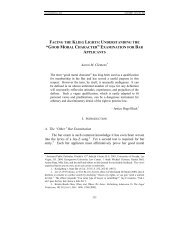The Science and Statistics Behind Spanking Suggests that
The Science and Statistics Behind Spanking Suggests that
The Science and Statistics Behind Spanking Suggests that
You also want an ePaper? Increase the reach of your titles
YUMPU automatically turns print PDFs into web optimized ePapers that Google loves.
11-FULLER_FINAL_AFTERPROOF.DOC 2/17/2009 8:50 AM<br />
2009] THE SCIENCE AND STATISTICS BEHIND SPANKING 303<br />
<strong>The</strong> media also didn’t mention <strong>that</strong>, of all the children in his study,<br />
Dr. Straus drew his conclusions from only extreme cases. 328 <strong>The</strong>y failed<br />
to say <strong>that</strong> his study did not represent the vast majority of families,<br />
having surveyed only children from unusually young mothers. 329 And<br />
they never said <strong>that</strong> the unpublished part of Dr. Straus’ study actually<br />
suggests spanking is beneficial for initially disruptive children. 330<br />
In general, the media doesn’t talk about the possibility <strong>that</strong><br />
spanking may have benefits. Even when they do report spanking<br />
positively, they also include anti-spanking views, which tends to dilute<br />
any message <strong>that</strong> spanking may be helpful.<br />
For example, USA Today reported <strong>that</strong> one thing CEOs<br />
“overwhelmingly have in common” is <strong>that</strong> they were spanked as<br />
children. 331 <strong>The</strong> journalist interviewed leaders like Dave Haffner, CEO<br />
of Fortune 500 manufacturer Leggett & Platt. “‘I received the belt when<br />
I deserved it,’ said Haffner [speaking] with obvious love in his voice for<br />
his father . . . . ‘I’m disciplined, detailed <strong>and</strong> organized.’” 332<br />
328. Compare id. (noting <strong>that</strong> Straus failed to release the results of anything but the most<br />
extreme high frequency group <strong>and</strong> suggesting <strong>that</strong> “9-year-olds who are spanked at the rate of every<br />
other day may have serious behavioral problems quite apart from their being spanked”), with<br />
Baumrind, Discipline Controversy, supra note 157, at 409 (saying <strong>that</strong>, by age 9, only one third of<br />
the parents spanked their children as often as once a month). Thus, nine-year-old children <strong>that</strong> are<br />
spanked this often either have abnormal behavioral problems or live in unusual situations.<br />
329. Rosellini, supra note 27 (“But neither the press release nor many of the news reports<br />
mentioned the study’s gaps: <strong>that</strong> 9-year-olds who are spanked at the rate of every other day may<br />
have serious behavioral problems quite apart from their being spanked, <strong>and</strong> <strong>that</strong> the 807 mothers in<br />
the survey were just 14 to 24 years old at the time they gave birth—hardly a representative<br />
sample.”).<br />
330. See LARZELERE, COMBINING LOVE, supra note 184 (“Relatedly, Straus (personal<br />
communication) has reported <strong>that</strong>, in three of the five cohorts in Straus et al. (1997) [the study<br />
currently being discussed], the outcomes of spanking frequency depended upon the initial level of<br />
the child’s antisocial behavior. <strong>Spanking</strong> frequency reduced antisocial behavior in the most<br />
antisocial children, but increased it in the least antisocial children. This is consistent with the idea<br />
<strong>that</strong> contingent punishment is particularly important for turning around the misbehavior of<br />
disruptive children, but <strong>that</strong> parents should be resorting more often to gentler tactics such as<br />
reasoning with better behaved children.”).<br />
331. Del Jones, Hit with the Question: Were You Spanked? CEOs Say Yes, USA TODAY, Oct.<br />
9, 2006, at Money (also saying, “USA TODAY interviewed about 20 CEOs over three months <strong>and</strong>,<br />
while none said they were abused, neither were any spared. Typical is General Motors (GM) CEO<br />
Rick Wagoner, 53. He got an occasional ‘whack in the fanny,’ while growing up in Richmond, Va.,<br />
but said he had it coming . . . .” Among those <strong>that</strong> had been spanked were General Motors CEO<br />
Rick Wagoner, Time Warner CEO Richard Parsons; Shell Chemicals Executive Vice President Fran<br />
Keeth, Alliant Energy Resources former CEO Erroll Davis, SCO Group CEO Darl McBride, TD<br />
Ameritrade CEO Joe Moglia, <strong>and</strong> United Way CEO Brian Gallagher.).<br />
332. Id.

















